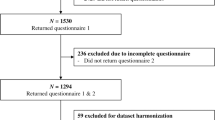Abstract
Secondary complications following spinal cord injury (SCI) include decubitus ulcers and recurrent urinary tract infections. These conditions can significantly impair quality of life and prove life-threatening; it is also believed that these conditions are mediated by behavioral pathways. According to the social problem-solving model, persons who report effective problem-solving skills should be capable of adhering to long-term therapeutic regimens of self-care necessary to prevent these complications. We tested this assumption in the present study. Discriminant function analyses revealed self-appraised skills in approaching and defining problems contributed to the prediction of secondary complications among 53 persons with SCI. Results are discussed in light of the social problem-solving model, and the utility of problem-solving interventions in rehabilitation is explored.
Similar content being viewed by others
References
Anderson, T. A., & Andberg, M. M. (1979). Psychosocial factors associated with pressure sores.Archives of Physical Medicine and Rehabilitation, 60 341–346.
Arean, P. A., Perri, M., Nezu, A., Schein R., Christopher, F., & Joseph, T. (1993). Comparative effectiveness of social problem-solving therapy as treatments for depression in older adults.Journal of Consulting and Clinical Psychology, 61 1003–1010.
Auerbach, S. M. (1989). Stress management and coping research in the health care setting: An overview and methodological commentary.Journal of Consulting and Clinical Psychology, 57 388–395.
Chartrand, J., Rose, M., Elliott, T., Marmarosh, C., & Caldwell, S. (1993). Peeling back the onion: Personality, problem solving, and career decision making styles.Journal of Career Assessment, 1 66–82.
D'Zurilla, T. J., & Goldfried, M. R. (1971). Problem solving and behavior modification.Journal of Abnormal Psychology, 78 107–126.
D'Zurilla, T. J., & Nezu, A. (1990). Development and preliminary evaluation of the social problem solving inventory.Psychological Assessment, 2 156–163.
D'Zurilla, T. J., & Sheedy, C. (1991). Relation between social problem-solving ability and subsequent level of psychological stress in college students.Journal of Personality and Social Psychology, 61 841–846.
Elliott, T. (1992). Problem-solving appraisal, oral contraceptive use, and menstrual pain.Journal of Applied Social Psychology, 22 286–297.
Elliott, T., & Marmarosh, C. (1994). Problem-solving appraisal, health complaints, and health-related expectancies.Journal of Counseling and Development, 72 531–537.
Elliott, T., Godshall, F., Herrick, S., Witty, T., & Spruell, M. (1991). Problem solving appraisal and psychological adjustment following spinal cord injury.Cognitive Therapy and Research, 15 387–398.
Elliott, T., Herrick, S., & Witty, T. (1992). Problem-solving appraisal and the effects of social support among college students and persons with physical disability.Journal of Counseling Psychology, 39 219–226.
Elliott, T., Herrick, S., MacNair, R., & Harkins, S. (1994). Personality correlates of self-appraised problem-solving ability: Problem orientation and trait affectivity.Journal of Personality Assessment, 63 489–505.
Elliott, T., Shewchuk, R., Richeson, C., Pickelman, H., & Weaver-Franklin, K. (1994).Self-appraised problem-solving ability, postpartum depression, and delivery complications (manuscript submitted for review).
Elliott, T., Sherwin, E., Harkins, S., & Marmarosh, C. (1995). Self-appraised problem-solving ability, affective states, and psychological distress.Journal of Counseling Psychology, 42 105–115.
Fehrenbach, A., & Peterson, L. (1989). Parental problem-solving skills, stress, and dietary compliance in phenylketonuria.Journal of Consulting and Clinical Psychology, 57 237–241.
Fuhrer, M. J., Garber, S., Rintala, D., Clearman, R., & Hart, K. (1993). Pressure ulcers in community-resident persons with spinal cord injury: Prevalence and risk factors.Archives of Physical Medicine and Rehabilitation, 74 1172–1177.
Heppner, P. P. (1988).The Problem-Solving Inventory: Manual. Palo Alto, CA: Consulting Psychologists Press.
Krause, J., & Crewe, N. (1987). Prediction of long-term survival of persons with spinal cord injury: An 11-year prospective study.Rehabilitation Psychology, 32 205–213.
Lerner, M. S., & Clum, G. A. (1990). Treatment of suicidal ideators: A problem-solving approach.Behavior Therapy, 21 403–411.
MacNair, R., & Elliott, T. (1992). Self-perceived problem-solving ability, stress appraisal, and coping over time.Journal of Research in Personality, 26 150–164.
Nezu, A. M., & D'Zurilla, T. J. (1989). Social problem solving and negative affect. In P. Kendall & D. Watson (Eds.),Anxiety and Depression: Distinctive and Overlapping Features (pp. 285–315). San Diego, CA: Academic Press.
Nezu, A., & Perri, M. (1989). Social problem-solving therapy for unipolar depression: An initial dismantling investigation.Journal of Consulting and Clinical Psychology, 57 408–413.
Phillips, S. D., Pazienza, N., & Ferrin H. (1984). Decision-making styles and problem-solving appraisal.Journal of Counseling Psychology, 31 497–502.
Richards, C. A., & Perri, M. G. (1978). Do self-control treatments last? An evaluation of behavioral problem solving and faded counselor contact as treatment maintenance strategies.Journal of Counseling Psychology, 25 376–383.
Rodriguez, G. P., & Garber, S. L. (1994). Prospective study of pressure ulcer risk in spinal cord injury patients.Paraplegia, 32 150–158.
Stover, S. L., Lloyd, L. K., Waites, K., & Jackson, A. (1989). Urinary tract infection in spinal cord injury.Archives of Physical Medicine and Rehabilitation, 70 47–54.
Tabachnick, B., & Fidell, L. (1989).Using Multivariate Statistics. New York: Harper & Row.
Turk, D. C., & Meichenbaum, D. (1989). Adherence to self-care regimens: The patient's perspective. In R. H. Rozensky, J. J. Sweet, & S. M. Tovian (Eds.),Handbook of Clinical Psychology in Medical Settings (pp. 249–266). New York: Plenum.
Waites, K. B., Canupp, K. C., & DeVivo, M. (1993a). Epidemiology and risk factors for urinary tract infections following spinal cord injury.Archives of Physical Medicine and Rehabilitation, 74 693–695.
Waites, K. B., Canupp, K. C., & DeVivo, M. (1993b). Eradication of urinary tract infection following spinal cord injury.Paraplegia, 31 645–652.
Witty, T. E., & Bernard, C. B. (1994, August).Problem-solving appraisal and psychological adjustment of chronic low back pain patients. Paper presented at the convention of the American Psychological Association, Los Angeles.
Author information
Authors and Affiliations
Rights and permissions
About this article
Cite this article
Herrick, S., Elliott, T.R. & Crow, F. Self-appraised problem-solving skills and the prediction of secondary complications among persons with spinal cord injuries. J Clin Psychol Med Settings 1, 269–283 (1994). https://doi.org/10.1007/BF01989628
Issue Date:
DOI: https://doi.org/10.1007/BF01989628




